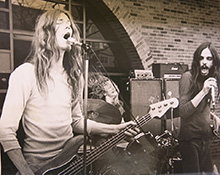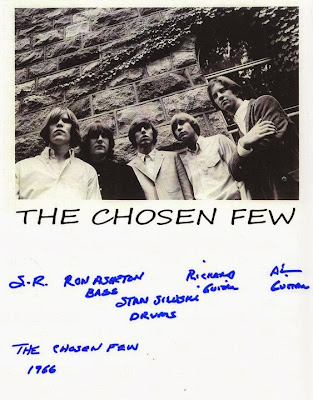
Sure, the MC5 and the Stooges weren’t the only national acts to come out of Detroit’s late-’60s rock scene — viz. the Amboy Dukes, Bob Seger and Grand Funk Railroad — but these two bands hold a special mystique for fans tracing the roots of punk to the Motor City.
The post-garage music scene in eastern Michigan was tightly intertwined, bursting with talented bands connected to these breakout acts. Here are five you should know about:
- The Up. The Up was the band Elektra Records left behind when label boss Jac Holzman watched the MC5, the Stooges and the Up perform at the University of Michigan’s Union Ballroom September 22, 1968. Unlike the other two groups, the Up weren’t signed to Elektra and in fact never scored a major label. The band kept pushing their raw edge until 1972, however, at local events (including a supporting role at the Dec. 10, 1971, rally headlining John Lennon and Yoko Ono and organized in solidarity with MC5 manager John Sinclair after his notorious marijuana bust). A retrospective compilation of the Up was finally released in 1995. In the liner notes, John Sinclair (at whose commune the Up shared digs with the MC5 and whose brother David Sinclair managed the Up) wrote, “It’s common to name the MC5 and the Stooges among the forefathers of what they call punk rock, but it was their associates in a third band, the Up, who could more accurately be identified as the real precursors of punk.”
- The Rationals. Hailing from Ann Arbor, the Rationals got as far as #92 on the Billboard Hot 100 with a cover of Otis Redding’s “Respect.” In the 1970s, guitarist/vocalist Scott Morgan would join Fred “Sonic” Smith of the MC5, Scott Asheton of the Stooges and Gary Rasmussen of The Up in Sonic’s Rendezvous Band, an elusive Detroit supergroup that released only one single in its five years together. The lyrics of “Get Up And Get Out” from Iggy Pop’s 1980 album “Soldier” are mostly borrowed from Eddie Holland’s 1963 Motown single “Leaving Here,” which was covered by the Rationals. Compare them here:
- The SRC. Short for the Scot Richard Case, the band shared many bills with the MC5 and the Stooges (and manager Jeep Holland with the Rationals). In fact, the SRC almost absorbed the Stooges before the Stooges ever formed: According to Gimme Danger: The Story of Iggy Pop, “Pretty boy Scott Richardson, lead singer with the now-defunct Chosen Few, wanted to put together a band of his own, the Scott Richardson Case, with [future Stooges] Scott Asheton and Iggy and Ron [Asheton] on bass. This never happened — the nascent Stooges felt they should pursue their own hopes and beliefs — though the SRC went on to have a proper regional career in the years ahead.” The SRC that did form around Richardson was notable for guitarist Gary Quackenbush, often cited as one of the region’s greatest players in a crowded field (although a short West Coast tour in August 1969 prompted the SRC to push Quackenbush from the band in September to pursue a more “San Francisco” sound). The band finally disbanded for good in 1973, after a welter of personnel changes, a periodic regional tours and three albums.
- The Prime Movers. Most fans of Iggy Pop probably know he got his stage name from the moniker of his first high-school band, the Iguanas. Besides picking him up for a pre-Stooges stint behind the drum kit, Iggy’s next group — the Prime Movers — went on to establish itself in its own right as blues purists who were a central force in the Detroit scene (although they never released a record). Iggy’s replacement as the Prime Movers’ drummer, Jesse “J.C.” Crawford, was simultaneously MC for the MC5 — with whom the Prime Movers played often — notorious for the call to “Kick out the jams, motherf***ers!” Early in its run, the band was managed by Jeep Holland, who also worked with the SRC and the Rationals. Quoted in Iggy Pop: Open Up and Bleed, Prime Movers keyboardist Bob Sheff credits leader Michael Erlewine (an early traveling companion of Bob Dylan) as “not a mentor, exactly, but he made [Iggy]. The experience was important to Iggy in an emotional way. Michael liked very emotional situations, and he put that into the music a lot. Iggy’s the same way.” Erlewine remains a forceful personality; check out this song posted to his YouTube channel, complete with a narrative explaining in no uncertain terms why the band never compromised to score a recording deal.
- The Chosen Few. The most ephemeral band on the list, the Chosen Few left behind no audio record — but it was co-founded by future Stooge James Williamson with SRC vocalist-to-be Scott Richardson — then introduced Williamson to Ron Asheton and Iggy Pop. After only a couple of gigs with the band, Williamson was sent to juvenile hall, then to boarding school in upstate New York. On a visit home, he went to see his old band. “[Original bassist] Kip Phillips was going off to college and so a new bass player named Ron Asheton was in the band,” Williamson writes. “I was impressed at how long Ron’s hair was and that he barely looked at the audience … just played into his amp with his back to the audience. That night was the first night I met Ronnie. Iggy was there too that night, and it was also the first time I met him as well. I had brought my White Fender Jaguar with me, and during a break I played some of my original songs for him. He said he liked them, but it was hard to tell. Surely, he’s told me how frenetic he remembers them being and that that impression was a lasting one for him and something he remembered when he finally asked me to join the Stooges in late 1970/early ’71.”
